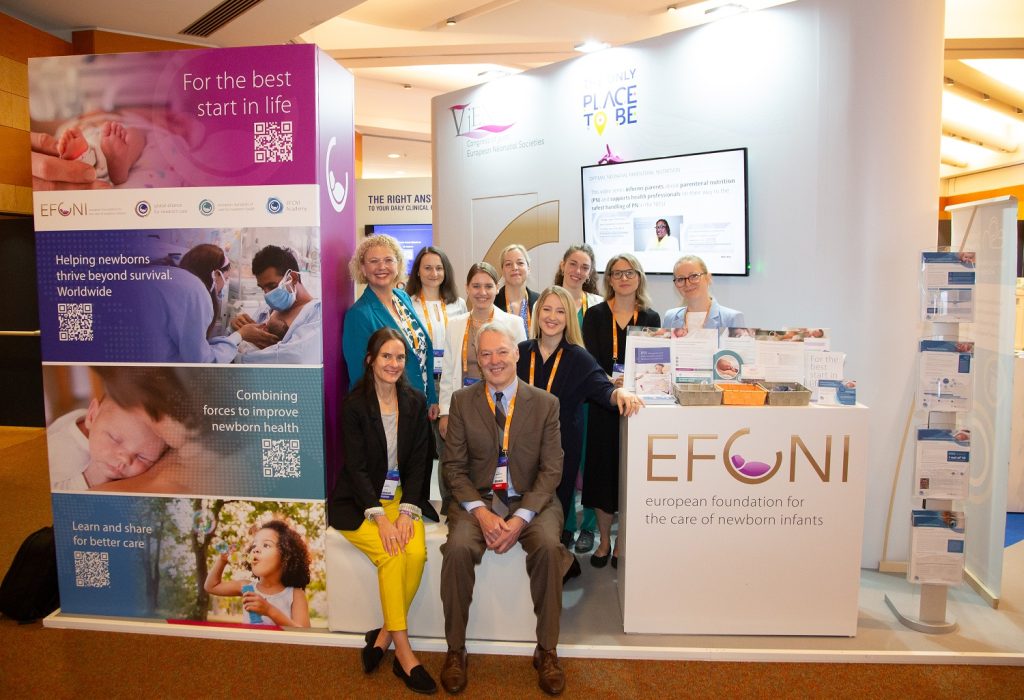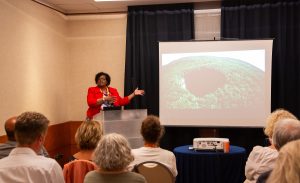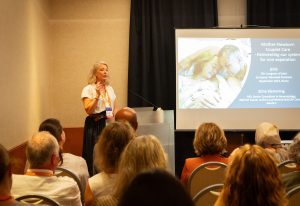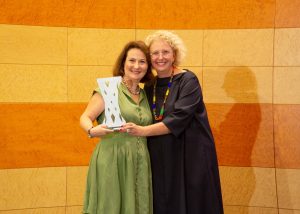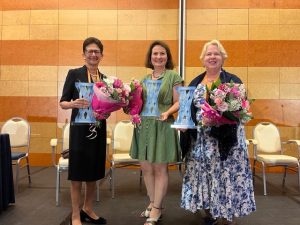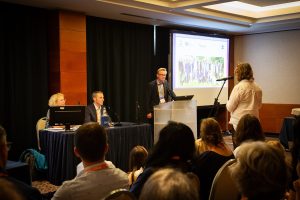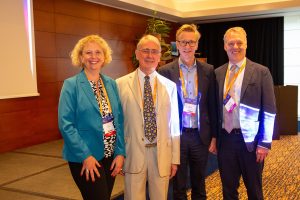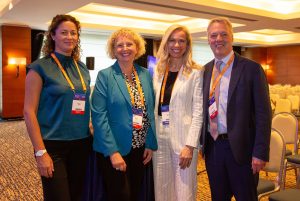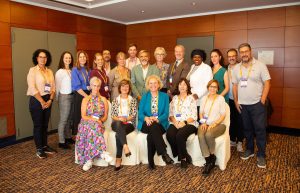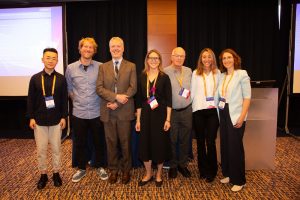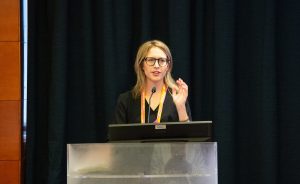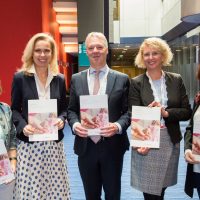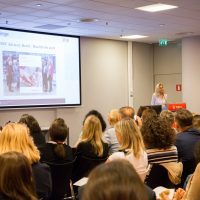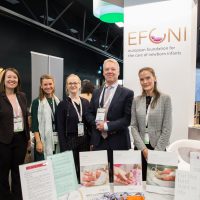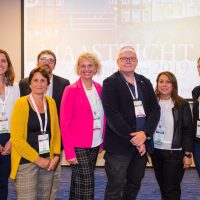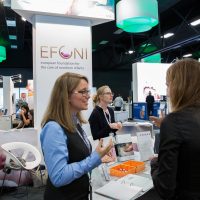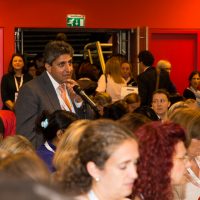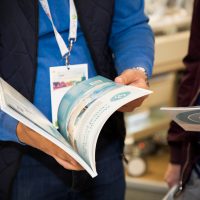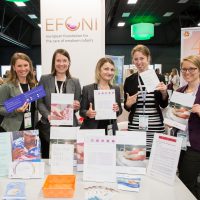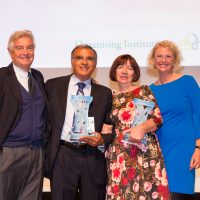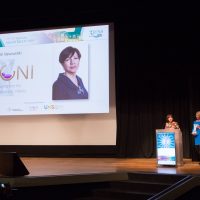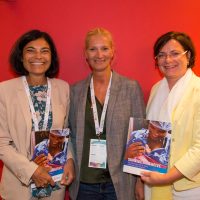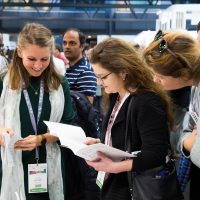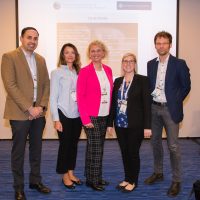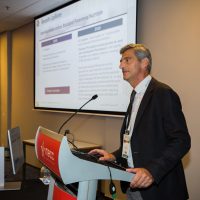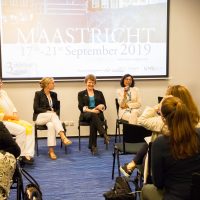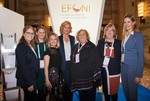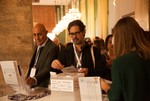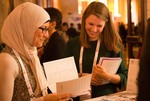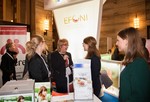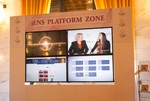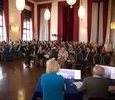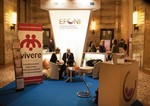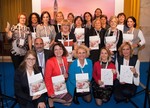Congress of joint European Neonatal Societies (jENS)
The Congress of joint European Neonatal Societies (jENS) is the first international neonatology congress where medical societies, scientists, healthcare professionals and parent representatives form a partnership and contribute equally to the congress programme. It is a prestigious international event organised by the European Society for Paediatric Research (ESPR), the Union of European Neonatal and Perinatal Societies (UENPS) and the European Foundation for the Care of Newborns (EFCNI) and also their joint biennial meeting. The congress covers various topics such as neurology, cardiology, pulmonology, infectious diseases, nutrition, epidemiology, nursing and parent-centred care. The congress also offers pre-congress courses, workshops, prizes and scholarships for young researchers and a session on women and diversity in neonatology. The congress is aimed at neonatologists, paediatricians, nurses, researchers, parent associations and industry partners from across Europe and beyond. Since the launch of the congress in 2015, EFCNI has been a member of the organising societies and the executive committee. At every congress, EFCNI presents a whole day of pre-courses and several own scientific sessions covering topics that are important and relevant to both parents and healthcare professionals.
Over the years, jENS has developed into an important congress with around 1500 to 2000 attendees. With an audience from all over the world, jENS is a truly international event, where neonatal physicians and nurses, paediatricians, parent- and patient representatives get together to discuss how neonatal care and short and long-term health outcomes can be improved.
Fifth Congress of joint European Neonatal Societies held in Rome
jENS 2023 was the 5th Congress of the Joint European Neonatology Societies, held this year in Rome from 19 to 23 September 2023. The aim of jENS is to present and discuss the latest scientific findings and clinical experience in the field of neonatology in order to improve the health of preterm and sick newborn infants. It is our pleasure and honour to be the co-organiser of the jENS Congress for the fifth time. This congress will always be a special one for us, as it brings together healthcare professionals and parent and patient representatives to share and learn from each other. This year we contributed with a pre-course, chairing several sessions, and a workshop, giving talks and selected our winner for the jENS award.
Tuesday, 19 September 2023
Today’s pre-congress course, “Partnering with parents: How can parents become partners in the care of their infants”, given by our Chairwoman Silke Mader, was already a successful start to this year’s congress. With a high attendance rate and lively discussions, the participants exchanged experience, shared concerns and offered advice and support to each other.
Besides the exciting expert contributions, providing very hands-on experience on implementing infant and family-centred developmental care in their units, the stirring contribution from Gigi Khonyongwa-Fernandez impressively conveyed the parents’ perspective on this matter. “Making a change towards family-centred care is a question of space but it starts in the space that is our mind.”, as neonatologist Dr Gina Ancora stated so rightly.
We were also flashed by the exhibition and our booth and hope to have many congress visitors visit us.
The official congress opening ceremony, was another highlight. Not only was there a warm video welcome from Orazio Schillaci, Italy’s Minister of Health, but illustrious speakers like Barbara Jatta, Director of the Vatican Museums, Carlo Giaquinto, with his talk on global paediatric/newborn health, and an intriguing round table discussion in global neonatal care, enriched this evening and provided food for thought.
The jENS Awards were the splendid final of a first day here at jENS in Rome.
Our heartfelt congratulations go to our EFCNI awardee, Ilknur Okay co-founder and president from the Turkish parent organisation El Bebek Gül Bebek, Committee Member of GLANCE and a member of the ESCNH Parent, Patient and Public Advisory Board (PPPAB) within our international network of parent and patient organisations. a long-term, trustful partner in the EFCNI community and we thank her for her outstanding achievements in improving newborn health across Turkey and beyond.
Additionally, we congratulate the ESPR and UENPS awardees, Professor Heike Rabe (ESPR), and Professor Neena Modi (UENPS).
Wednesday, 20 September 2023
The second congress day started with an early buzzing poster walk session. In the hustle and bustle we had the pleasure to meet Dr Andrei S. Morgan, partner in the TREOCAPA research project, who presented his poster on “Long term follow-up after trials using a European platform of preterm birth cohorts: LIFT-UP Preterm”.
Shortly after, Silke Mader and Prof Luc Zimmermann chaired the first set of parallel sessions on “Ethical aspects around new technologies and research trials”. The central theme emphasised collaboration as the key to advancing neonatal health research and securing funding for better outcomes for our children. EFCNI’s medical director Prof Luc Zimmermann followed with his dedicated session on “Patient involvement in neonatal research and new technologies”. His demand was to reduce barriers in parent involvement by placing the patient at the very centre of clinical trials.
In the EFCNI-led “Golden Hour” afternoon session, our highly esteemed expert, Dr Lukas Mileder, spoke about patient safety and ways to “keep the baby warm – thermoregulation”.
The end of an enlightening and educational congress day was the wonderful “Kangaroo Mother Care” session by Dr Stina Klemming, who posed the question: If a parent’s love and closeness is not paramount in a child’s wellbeing, then what is? In her answer, she made a strong vote for skin-to-skin care directly after birth, a topic that is also very close to our hearts.
Thursday, 21 September 2023
Thursday, was intense: super busy, productive and immensely insightful. We are so grateful for the great community of supporters, partners, medical experts and patient representatives who join forces in driving newborn and maternal health.
The morning began with a session on improving preterm infant nutrition and feeding. Speaker Prof. Magnus Domellöf shared intriguing insights into fortification practices in the NICU and how and why different approaches are being looked into. His presentation was followed by Prof. Luc Zimmermann who gave a talk on how parents can be informed and involved in nutrition pathways of their baby in the NICU. “Being in the NICU is a stressful experience for the baby and the parents. Moreover, feeding problems are the most common difficulties after discharge. Informing and involving parents in care procedures early on is the best way to coregulate the stress in parents and improve the health outcome in babies.”, he concluded.
We also had the pleasure of supporting two symposia. In the first symposium, our renowned experts, Prof. Angelika Berger and Prof. Raffaella Nenna, addressed the topic of RSV and shed light on the epidemiology and the most critical risk factors for RSV infections in the post-COVID era.
In the second symposium, we discussed the benefits of breast milk for preterm infants regarding their developmental outcomes with Prof. Magnus Domelöff and Prof. Jean-Michel Hascoët.
The programme continued with a workshop on patient safety and how a blame-free culture can enhance the quality of neonatal care, especially in emergencies.
The congress programme also featured important societal and political issues impacting newborn and maternal health. A session dedicated to war and migration shed light on the problematic and upsetting situations healthcare staff and pregnant women, affected by such precarious settings, must face.
Friday, 22 September 2023
Another fantastic congress day and we were delighted to welcome many old friends and new faces at our booth!
At noon, Isabel Geiger, Head of the European Standards of Care for Newborn Health (ESCNH) at EFCNI, and Verena Krause, ESCNH Project Manager, hosted various experts at the Ambassador Lunch Kick-off Meeting. The Ambassador Programme showcases outstanding contributions by individuals from all over Europe who are committed to advancing the ESCNH. It is targeted at interested Chair Committee members and engaged healthcare professionals, parent representatives, preterm-born adults or adolescents, and politicians. The main aims of this event are to increase awareness, expand the network of the ESCNH, promote certain topics or standards, and to advance the translation of standards and their implementation.
In the afternoon, the programme continued with an enlightening presentation by Dr Christina Tischer, Head of Scientific Affairs and Research at EFCNI, who presented first results of the ResQFamily study. The findings suggest that an infant’s severe RSV infection negatively impacts affected parents‘ Quality Of Life and overall family functioning, especially during the acute infection phase. These findings emphasise the need for greater disease awareness and the importance of preventative measures among HCPs, patient representatives and decision-makers.
Saturday, 23 September 2023
It’s a wrap! Five congress days full of inspiring talks, insightful lectures, vivid debates and great networking opportunities have come to an end and we feel happy and grateful for this jENS experience!
Today, we chaired our last sessions on Infant and family-centred developmental care (#IFCDC) and parents in the NICU together with Prof. Karen Walker. During the session, our experts presented topics that are really close to our hearts, such as Kangaroo Mother Care (#KMC) and Couplet Care, the role of fathers in the NICU and stress prevention after preterm birth.
We were delighted that so many people attended our session on the final congress day and that the lively discussions demonstrated the importance of these topics in neonatology and their impact beyond.
We want to thank everyone who stopped by our booth to get in touch and share their stories with us.
A special thank you goes to our parent community who joined us and represented the parents’ voice and perspective in this congress. Last but not least, we would like to thank MCA Scientific Events for giving us the opportunity to participate in this special congress and for giving us and parent organisations the chance to represent parents and patients in the discourse on newborn and maternal care.
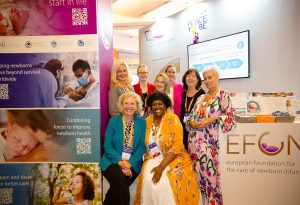 We will surely remember this #JENScongress for a long time and are already counting the days until we reunite at jENS2025!
We will surely remember this #JENScongress for a long time and are already counting the days until we reunite at jENS2025!
jENS 2021 – The virtual place to be
The 4th jENS Congress has faced challenges that were not even foreseeable in the early planning stages in 2019. The worldwide COVID-19 pandemic made meetings of any kind almost impossible. While some congresses and conferences were still cancelled in 2020, MCA, the agency responsible for jENS, decided early on to hold the congress virtually. The fact that the Congress had 2343 participants, represented attendees and speakers from 115 countries, and that the digital platform enabled interested people from low- and middle-income countries to participate in a high-level program shows how right this decision was.
Face-to-face interaction can never be replaced by a virtual event, but the digital jENS has given so many researchers the opportunity to present their research, so many Healthcare professionals to share their experience and best-practice examples, as well as parent representatives, to get in touch with professionals.
We look back on a successful event filled with many exciting presentations and intensive discussions.
Our thanks go to the co-organising societies, ESPR and UENPS, to all speakers and all attendees for their input and feedback.
We look forward to seeing you at the 5th jENS in 2023!
Saturday, 11 September
Traditionally jENS starts with a set of pre-congress-courses, of which one is chaired by EFCNI. This year we opened the pre-congress with a session on “Dealing with parents in critical care decision”, discussing the challenging topic of ethical decision-making processes in neonatal care. The day continued with a course on “Meeting the parents’ needs”, with talks by Professor Jos Latour, Dr Fauzia Paize, Dr Lars Garten and Professor Dominic Wilkinson. EFCNI’s chairwoman Silke Mader highlighted the parent perspective on how parents can be involved in making critical care decisions. Lastly, speeches by Professor Nicholas Embleton and Fernanda Sampaio de Cavalho rounded off the course.
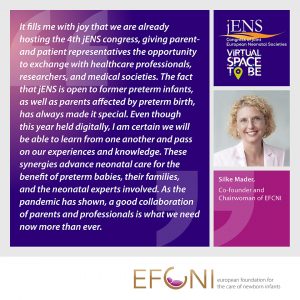 Tuesday, 14 September
Tuesday, 14 September
The first official day at jENS is always very special as the jENS awards are being celebrated, followed by an intriguing opening ceremony that usually sheds a whole different light on medicine and neonatology. At this years’ jENS awards the Congress Committee, comprising Prof. Charles C. Roehr (President of ESPR), Silke Mader (Chairwoman of EFCNI), and Prof. Corrado Moretti (President of the UENPS) honoured the commitment and work of Gorm Greisen (ESPR awardee), Ola Saugstad (UENPS awardee), and the Societa Italiana di Neonatolgia (SIN) and Vivere onlus (EFCNI awardee). EFCNI had the honour to award these two organisations as they have formed a powerful collaboration of healthcare professionals and parent representatives to implement the European Standards of Care for Newborn Health by translating the entire set of 96 standards into Italian and preparing their launch at a national congress in order to provide each NICU in Italy with a printed copy. This huge organisational challenge was made possible by the commitment of experts from all over Itlay who helped to realise this project even during the challenging times of the pandemic. “Overcoming the language barrier is such a big and such an important step towards the implementation of improved neonatal care”, stated Silke Mader in her speech.
Wednesday, 15 September
In EFCNI’s parallel session on improving quality of neonatal care, hosted by Silke Mader (Chairwoman of EFCNI) and Professor Nicoletta Iacovidou, the audience coul, amongst others, learn about the ICHOM Standard Set for Preterm and hospitalised newborns and the power of quality measurements. In the afternoon, EFCNI invited to another session on Newborn screening with a focus on Retinopathy of Prematurity (ROP), metabolic- and also hearing screening.
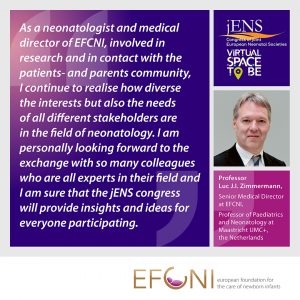 Thursday, 16 September
Thursday, 16 September
For everyone intrigued by the field of neonatal nutrition, our parallel session, chaired by Silke Mader and Professor Elisavet Diamanti, focusing on “Safe and optimal nutrition”, should not be missed. The session comprised highly relevant topics such as human milk diet, parenteral nutrition of very low birth weight infants, insights into a novel pasteurisation treatment for human milk and many more. Professor Christoph Fusch has dedicated his talk to introduce the audience to our newly developed toolkit for parenteral nutrition of preterm and sick newborns.
In workshop 3, hosted by Professor Luc Zimmermann, one had the opportunity to learn how video recordings can help auditing neonatal resuscitation and how other key technologies are for improving delivery room management of very preterm newborns. Then, join workshop no. 3 on safety, chaired by EFCNI’s medical director Professor Luc Zimmermann, and Dr Pierre Kuhn. For more input on patient safety, in the symposium, ‘The Golden Hour — European Resuscitation Council Guidelines for Newborns & Neonatal resuscitation with ECG monitoring’, supported by GE Healthcare, renowned expert Dr Tomasz Szczapa talked about the new European guidelines for resuscitation.
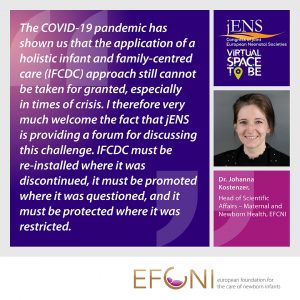 Friday, 17 September
Friday, 17 September
“Taking care of newborns needing intensive care, coming from families in challenging situations” was the title of EFCNI’s 5th session. The chairs discussed together with experts and the digital attendees, de-escalation strategies with parents, the effects of parent-provider communication during NICU stays, and how parents and staff experience the current visitation restrictions in NICUS during the COVID-19 pandemic. Those who wanted to dive deeper into the impacts of COVID-19 on neonatal care could attend the Corona Session. Hosted by Professor Boris Kramer (the Netherlands) and Silke Mader (Chairwoman of EFCNI) it gave reflected insights into the NICU situation during the pandemic. In this regard, Dr Johanna Kostenzer (Head of Scientific Affairs, EFCNI) also presented preliminary results of the global parent survey where more than 2100 parents from 56 countries shared their experiences of how care was provided to their hospitalised newborn during the pandemic. In addition to that, our digital booth also provided information on the impact of COVID-19 on other diseases such as RSV for istance.
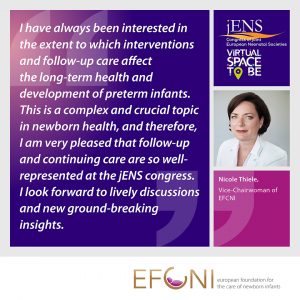
Saturday, 18 September
The last day at jENS started early! In EFCNI’s parallel session on the long-term outcomes of preterm born infants, Jennifer Zeitlin (INSERM) starting with a presentation of the RECAP preterm cohort. The session also featured insights about parental bonding effects, music therapy and the predictive power of newborn neurobehaviour on cognitive and neurodevelopmental outcomes after preterm birth. For the first time, one of the speakers in this session was a former patient of the NICU: Juliëtte Kamphuis presented her case of being born preterm and receiving a BPD diagnosis (after being mis- and re-diagnosed several times over a time span of more than a decade) aged 40. Her case makes clear that the late effects of preterm birth sometimes only become apparent after decades and even experts can struggle to interpret them correctly. The congress finished with a stunning closing session about artificial intelligence and how it may – and already does – enable a whole new spectrum of possibilities in neonatal care.
Sessions on-demand
If you missed any of the sessions or workshops, we have good news for you: all content has been recorded and registered attendees have the opportunity to re-watch sessions and workshops using their login data. For more information visit: https://www.mcascientificevents.eu/jens/
See you at jENS 2023!
The third jENS Congress 2019 in Maastricht – a special congress where parents and professionals meet and put neonates first
This year’s jENS was a real highlight in the congress season 2019. Located in the beautiful city of Maastricht, the Netherlands, 1,600 attendees, representing 71 countries, met from 16 to 21 of September, to discuss latest findings in research, means of improvement in care practices and much more.
Monday, 16 September, started with pre-courses about “Neonatal stabilisation in the delivery room”. The topics ranged from “Timing of cord clamping in preterms, asphyxia and infants with CDH” to “Monitoring oxygenation and heart rate stabilization at birth”, “Respiratory support in the golden minutes” and “Stimulation of breathing at birth”, among others.
On Tuesday, 17 September, EFCNI hosted the pre-congress course on “Infant-family-centred developmental care”. Another highlight in the morning was the course “Emotional closeness and support”, featuring talks by Prof. Renée Flacking (Sweden), the researcher Dr Hannakaisa Niela-Vilén (Finland), and a moving contribution by Livia Nagy Bonnard from our partnering parent organisation “Right(s) beside you” (Hungary). In the afternoon, Dr Margarita Tzaki, Dr Anastasia Kapetanaki, Dr Kalliopi Dritsakou and Dr Eleni Vavouraki from the Elena Venizelou Hospital Athens, shared a Greek best practice example how they introduced family-centred care in the challenging setting of a Greek hospital. The big finale of this day was the official opening of jENS. For the first time, the jENS Awards were handed over to three awardees, chosen by the three congress organisers ESPR, UENPS, and EFCNI. The award recognises and appreciates the commitment by the awardee in the field of neonatology. Our congrats go to Dr Michael Anthony Hall (ESPR Award), Professor Giuseppe Buonocore (UENPS Award), and Dr Eleni Vavouraki (EFCNI Award). A very special opening talk on the importance of creating a blame-free culture in order to encourage self-reflective interaction in medical emergency settings was given by Captain Hans Härting. Last but not least, EFCNI proudly launched the toolkit “Shaping the future – Combining forces to improve newborn health”. The toolkit aims to facilitate and support the implementation of the European Standards of Care for Newborn Health on a national, regional, and local level.
Tuesday ended with the launch of the toolkit and Wednesday, 18 September began with the big launch of our position paper “Addressing the nutritional emergency of preterm birth – Optimal practice in neonatal parenteral nutrition” as part of the EFCNI morning session “Patient safety”. Additionally, our partner Baxter hosted a fully packed lunch symposium with the title “Guideline recommendation and post implementation quality outcome measures” where Prof. Alexandre Lapillonne, one of the experts involved in developing the position paper, also referred to this newly released position paper in his insightful talk on nutrition guidelines for parenteral feeding.
In the afternoon, EFCNI hosted another session on “Comfort of the infant and the parents in the NICU” with interesting presentations by Prof. Pierre Kuhn and many more.
Thursday, 19 September was the big day to launch EFCNI’s new position paper “How can we protect preterm infants from RSV infections?” in a very well recieved lunch symposium with presentations by Prof. Angelika Berger and Prof. Luc Zimmermann. EFCNI also chaired the parallel session “Family-centred care”. The third congress day was rounded off by two great workshops: “How to improve follow-up in very preterm infants: Lessons from the SHIPS project”, introduced the EU-funded SHIPS cohort study whilst the session “Working together, saving lives, and ensuring babies and families thrive” (WHO report) presented the newly launched WHO/UNICEF report “Survive and thrive: transforming care for every small and sick newborn”, which was presented by Ornella Lincetto (WHO). EFCNI is honoured to be a part of this publication where 94 experts from 16 countries had been working on.
Friday, 20 September, was all about facts and figures. EFCNI chaired the session “The importance of measuring the quality of care”. During this session, Dr Johanna Pfeil from EFCNI gave an introduction to the project “European Standards of Care for Newborn Health”. Speaking of facts and figures, EFCNI alos presented an e-poster sat the jENS: Dr Silvia Kolossa from EFCNI’s scientific department presented the digital poster “Real World Data – Hidden Treasure for Neonatal Research?”
On Saturday, 21 September, the congress drew to a close. Nevertheless, the programme was filled with intriguing sessions. The last EFCNI parallel session “How does the interdisciplinary approach in research work?” included a talk about the role of parents in neonatal research by Nicole Thiele and a presentation about the RECAP preterm (Research on European Children and Adults born Preterm) project by Professor Dieter Wolke. This eventful conference was rounded off in the closing session “Parents – doctors interface” and the Young Investigator Awards ceremony, There was also a very touching moment when Prof. Neil Marlow called for a minute’s silence in commemoration of all the babies who passed away – big thanks to Prof. Neil Marlow for reminding every attendee that it’s the youngest and most fragile patients in our health care systems that this conference is all about.
See you in Athens at jENS 2021!
The 2nd Congress of joint European Neonatal Societies took place from 31 October to 4 November 2017 in Venice, Italy. The congress gathered together almost 2,000 participants from about 85 countries. They could attend remarkable sessions, impressive talks and took part in lively discussions. As part of the organising societies and executive committee, EFCNI had the honour to organise and chair one pre-course and six parallel and one plenary sessions. The EFCNI events covered a wide range of topics related to preterm birth such as pain reduction, family-centred developmental care, measurement of quality of care, digital patient care, and neonatal palliative care versus developmental care.
A Q&A with the four Presidents of this year’s jENS Congress
On the occasion of the congress, EFCNI launched the new position paper Involvement of parent representatives in neonatal research. It was developed by EFCNI in close collaboration with parent representatives from about 50 NGOs. The paper highlights current challenges and gaps as experienced by EFCNI and its partner organisations and suggests principles towards an infrastructure and framework that will lead to a beneficial partnership of both parties. EFCNI warmly thank the parent representatives from our network who actively contributed to the position paper. Special thanks to the EFCNI Parent Advisory Board whose members spent countless hours to realise this project.
Beyond this, another EFCNI publication was presented for the first time during the congress – a factsheet on the Respiratory Syncytial Virus (RSV). The leaflet features the problems this serious illness can cause in preterm babies and ways to prevent an infection. It was developed in close collaboration with Professor Luc Zimmermann who highlights the potential threat of the Respiratory Syncytial Virus: “RSV is a virus that is widely spread among the population, but many people don’t know about its existence. Since the lungs of preterm babies are not fully developed when they are born, they have an increased risk for a severe infection with RSV.”
We thank Professor Luc Zimmermann for his support and advice.
This year’s jENS congress in Venice also marked a change in the Council of the European Society for Paediatric Research (ESPR): Professor Luc Zimmermann handed over the Presidency to his successor Professor Charles Christoph Roehr. On this occasion, we would like to sincerely thank Professor Luc Zimmermann for his continuous commitment and strong support during the past years and we wish Professor Charles Christoph Roehr all the best for his new role. We furthermore look very much forward to our collaboration and many important common projects ahead.
After the congress is before the congress and we are already looking forward to the 3rd jENS congress taking place in Maastricht, the Netherlands, from 17 to 21 September 2019. See you in Maastricht!
Your EFCNI team
Special thanks to MCA Scientific Events for their organisational support.
Please find here a selection of images. If you wish to receive more images, please e-mail us.
The 1st joint European Neonatal Societies Congress (jENS) took place in Budapest from 16 to 20 September 2015.
For the first time, the European societies in neonatology ESPR, ESN, UENPS, and EFCNI organised a joint congress together with the national peri- and neonatal societies (Hungarian Society of Perinatology and Obstetric, Anesthesiology Hungarian Society of Perinatology) and the international nursing organisation COINN. As one of the organising institutions, EFCNI had the honour to organise pre-courses and congress sessions with well-known experts from different fields. The excellent collaboration between all societies and the congress agency MCA made this exceptional and well-organised congress a doubtlessly memorable event for the more than 2,500 participants who represented 83 countries.
The congress offered a multifaceted programme for different target groups such as clinicians, nurses, researchers, parents and patient representatives. Its wide range of content included best-practice sharing, newest research, policy issues and ethical questions. The mix of well-renowned speakers and young researchers ensured fascinating presentations and lively discussions. Particularly remarkable were the high attendance and active participation throughout the sessions. This was also supported by the successful integration of new technologies such as a congress app, electronic posters and congress TV for participation and information.
In addition to the interesting parallel sessions, the congress offered a festive opening event where top-notch speakers presented best practice and on the edge research, intriguing plenary sessions and excellent networking opportunities. The attractive exhibition showcased most recent technical developments and invited visitors to stay, to exchange and to discover.
A particular highlight of the congress’s networking opportunities was the networking dinner on a boat on the river Danube which in addition to stimulating conversations offered beautiful views of Budapest by night.
At the end of the congress, its closing ceremony highlighted current European and global challenges in neonatology and child health. The organising societies are happy about the great success of this first jENS congress and look forward to its next edition, the 2nd jENS congress in Venice, Italy, in October 2017.

